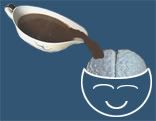Knowledge and Relationships
I've been reading a book called The Tipping Point by Malcolm Gladwell, and I just wanted to share an excerpt that I found very interesting. It may not help you do better in school, but it's something to think about.
When we talk about memory, we aren't just talking about ideas and impressions and facts stored inside our heads. An awful lot of what we remember is actually stored outside our brains. Most of us deliberately don't memorize most of the phone numbers we need. But we do memorize where to find them -- in a phone book, or in our personal Rolodex.Simply fascinating. The Tipping Point by Malcolm Gladwell is an amazing read, full of many examples and theories of how small changes can push circumstances past their tipping point.
[...]
Perhaps more important, though, we store information with other people. Couples do this automatically. A few years ago, for example, [Daniel] Wegner [of the University of Virginia] set up a memory test with 59 couples, all of whom had been dating for at least 3 months. Half of the couples were allowed to stay together, and half were split up, and given a new partner whom they didn't know. Wegner then asked all the pairs to read 64 statements, each with an underlined word, like "Midori is a Japanese melon liqueur." Five minutes after looking at all the statements, the pairs were asked to write down as many as they could remember. Sure enough, the pairs who knew each other remembered substantially more items than those who didn't know each other. Wegner argues that when people know each other well, they create an implicit joint memory system -- a transactive memory system -- which is based on an understanding about who is best suited to remember what kinds of things. "Relationship development is often understood as a process of mutual self-disclosure," he writes. "Although it is probably more romantic to cast this process as one of interpersonal revelation and acceptance, it can also be appreciated as a necessary precursor to transactive memory." Transactive memory is part of what intimacy means. In fact, Wegner argues, it is the loss of this kind of joint memory that helps to make divorce so painful. "Divorced people who suffer depression and complain of cognitive dysfunction may be expressing the loss of their external memory systems," he writes. "They once were able to discuss their experiences to reach a shared understanding. . . . They once could count on access to a wide range of storage in their partner, and this, too, is gone. . . . The loss of transactive memory feels like losing a part of one's own mind."
Labels: Musings, Random Interesting Facts









0 Comments:
Post a Comment
<< Home